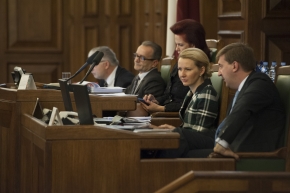 Gallery
Gallery
On Thursday, 31 October, the Saeima adopted in the final reading urgent amendments to the Immigration Law in order to introduce quotas for issuing residence permits to real estate buyers and prevent foreigners from obtaining residence permits in exchange for purchase of real estate containing agricultural land or forest.
In 2014, the Office of Citizenship and Migration Affairs will be limited to accepting not more than 700 applications for first-time residence permits on the grounds of purchasing real estate worth more than EUR 150,000. This quota will be reduced to 525 permits in 2015 and 250 in 2016.
The Office will also annually grant 100 first-time residence permits to buyers of real estate worth more than EUR 500,000. If more than 100 such applications are submitted, the Office may consider fewer applications submitted for transactions below EUR 500,000.
The amendments will also prevent foreigners from applying for residence permits if they have purchased real estate containing agricultural land or forest.
The amended Law will have a new threshold for transactions enabling foreigners to apply for permits. Five-year residence permits will be granted to foreigners who have bought a plot of built-up land worth at least EUR 150,000. Previously the threshold was LVL 100,000 in the planning region of Riga or cities, and LVL 50,000 in the rest of Latvia. The new threshold is universally applicable regardless of the location of the real estate.
Also, foreigners who invest at least EUR 280,000 (previously LVL 200,000) in a Latvia-based credit institution will be entitled to apply for term residence permits.
Five-year residence permits will also be made available to foreigners who purchase specific interest-free government bonds with a total nominal value of EUR 250,000 or who pay EUR 50,000 into Latvia’s state budget.
According to the amendments, in order to apply for residence permits, alongside the financial investments or investments in real estate, foreigners will also have to pay EUR 25,000 into Latvia’s state budget.
The EUR 25,000 payment will be transferred to the Economic Development Programme of the basic state budget. The Programme is administered by the Ministry of Economics. The use of these funds will be specified in the annual state budget, and the procedure for spending them will be set by the government.
It is expected that the amendments will come into force on 1 January 2014.
Saeima Press Service







